On 1 February the International Centre of the Focolare Movement had the joy of welcoming Argentine Rabbi Silvina Chemen, a longtime friend committed to interreligious dialogue. In an open and fraternal dialogue, she spoke of her participation in R20, the forum of religious leaders in Indonesia held just before the G20, and her pilgrimage to the Holy Land with a group of Jews and Christians. “If I take a look at my life, my commitment to interreligious dialogue, I can say that all roads begin here, with the Focolare Movement.” 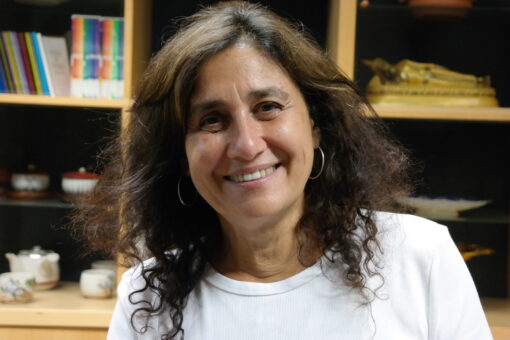 These were the extremely happy words that Rabbi Silvina Chemen used to address a large gathering of people, eager to greet her and ask her a few questions, during her visit at the beginning of February to the International Centre of Rocca di Papa in Italy. She is Argentinean, from Buenos Aires, a professor at the Latin American Rabbinical Seminary, and serves in the Bet-El community founded by Rabbi Marshall Meyer. Her commitment to dialogue between faiths is a choice that radically pervades her life and that has led her to get to know Chiara Lubich’s charism deeply, sharing the profound desire of ‘ut omnes’ (‘all be one’) by working intensely in favour of peace and universal brotherhood. In November Chemen participated in R20, the forum of religions in Indonesia, a historic moment that, in the presence of so many religious leaders, proudly defined how religions can truly be partners and help build a more peaceful society. “We, the religious people of the world, are part of society and have so much to offer to such a wounded world,” said Chemen. It is true, at this moment in history, on an international, political and religious level, we are taking the first steps toward a common dialogue. Yet we must take another step: looking further into the problems of ordinary people. It is a long journey, but one that over time, patiently, can bear the most beautiful fruit: valuing each other’s differences, cherishing them, lending an ear with interest and together looking toward a single goal. This, Silvina recalls, is what happened in the early experiences of dialogue between people of different religions that she was able to have. “My tradition, the Jewish tradition, is not just a set of precepts, rituals or a liturgy, but it is mixed with everyday life, with every moment of human life – our behaviour, actions, with what we are. It is a worldview of real life, so Judaism is not only lived inside the synagogue, but outside. “Being a cohesive community and witnessing with our lives: this is what I believe applies to everyone. It is often thought that we of various religions are not an integral part of society and that we must live within the walls of our communities. “Instead, I think we cannot miss this opportunity to speak to the world and to talk about dialogue, about what we have learnt from our experience, not to convince anyone, but to plant seeds of good, to have an impact on reality. “I am in love with this possibility of reading a religion through the eyes of current events. We are here to discomfort the comfortable and to support the uncomfortable. When one is too comfortable, it means one is completely disconnected from reality, which by nature is uncomfortable. Here, our mission is to be uncomfortable.”
These were the extremely happy words that Rabbi Silvina Chemen used to address a large gathering of people, eager to greet her and ask her a few questions, during her visit at the beginning of February to the International Centre of Rocca di Papa in Italy. She is Argentinean, from Buenos Aires, a professor at the Latin American Rabbinical Seminary, and serves in the Bet-El community founded by Rabbi Marshall Meyer. Her commitment to dialogue between faiths is a choice that radically pervades her life and that has led her to get to know Chiara Lubich’s charism deeply, sharing the profound desire of ‘ut omnes’ (‘all be one’) by working intensely in favour of peace and universal brotherhood. In November Chemen participated in R20, the forum of religions in Indonesia, a historic moment that, in the presence of so many religious leaders, proudly defined how religions can truly be partners and help build a more peaceful society. “We, the religious people of the world, are part of society and have so much to offer to such a wounded world,” said Chemen. It is true, at this moment in history, on an international, political and religious level, we are taking the first steps toward a common dialogue. Yet we must take another step: looking further into the problems of ordinary people. It is a long journey, but one that over time, patiently, can bear the most beautiful fruit: valuing each other’s differences, cherishing them, lending an ear with interest and together looking toward a single goal. This, Silvina recalls, is what happened in the early experiences of dialogue between people of different religions that she was able to have. “My tradition, the Jewish tradition, is not just a set of precepts, rituals or a liturgy, but it is mixed with everyday life, with every moment of human life – our behaviour, actions, with what we are. It is a worldview of real life, so Judaism is not only lived inside the synagogue, but outside. “Being a cohesive community and witnessing with our lives: this is what I believe applies to everyone. It is often thought that we of various religions are not an integral part of society and that we must live within the walls of our communities. “Instead, I think we cannot miss this opportunity to speak to the world and to talk about dialogue, about what we have learnt from our experience, not to convince anyone, but to plant seeds of good, to have an impact on reality. “I am in love with this possibility of reading a religion through the eyes of current events. We are here to discomfort the comfortable and to support the uncomfortable. When one is too comfortable, it means one is completely disconnected from reality, which by nature is uncomfortable. Here, our mission is to be uncomfortable.” 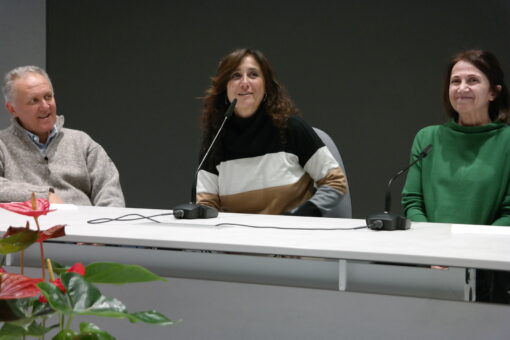 Silvina recently completed a pilgrimage to the Holy Land, the fruit of a journey that began in her city Buenos Aires some seven years ago, called ‘shared readings’. “Every first Monday of the month we met, Jews and Christians, to study the texts of the Bible,” she says. “It was a space of truth and knowledge, and also saw the participation of a Catholic theologian, José Luis D’Amico, from the Order of the Sisters of Sion, a Bible centre in Buenos Aires. “Other times we also had the joy of having Muslim brothers with us, and we were able to read together the Torah, the Gospel and some passages from the Quran. This experience led each of us to have a dream: a pilgrimage to the Holy Land together to revive the texts in their context.” That is how 45 people, including Jews and Catholic Christians, accompanied by an Israeli guide, had a truly intense experience from 9 to 22 January. They shared each other’s emotions in those places that were of value to each of them, understanding the ultimate message of the texts that were read. “We went between Jericho and Jerusalem,” Silvina says, “to the place where the Good Samaritan is said to have come upon the dying man. It is a text that is somewhat problematic for us Jews, since it could portray Jews as people without pity, as the Levite and the priest of the parable are described. “It was important to take on this text there, to give it another reading and understand that mercy was the key to that Word, as we also read in Ecclesiastes: better two than one, for if one falls, the other helps him (Ecc 4:9–10). “Immediately afterwards we did an exercise, that of talking to someone with whom we had not yet spoken during the trip. It was a truly unique moment: to have the opportunity to listen to each other, compare with each other and find a common message. “We were not a separate ‘we’ and ‘you’, but we were together. It was a precious moment – I would even say prophetic – of a truly united world.”
Silvina recently completed a pilgrimage to the Holy Land, the fruit of a journey that began in her city Buenos Aires some seven years ago, called ‘shared readings’. “Every first Monday of the month we met, Jews and Christians, to study the texts of the Bible,” she says. “It was a space of truth and knowledge, and also saw the participation of a Catholic theologian, José Luis D’Amico, from the Order of the Sisters of Sion, a Bible centre in Buenos Aires. “Other times we also had the joy of having Muslim brothers with us, and we were able to read together the Torah, the Gospel and some passages from the Quran. This experience led each of us to have a dream: a pilgrimage to the Holy Land together to revive the texts in their context.” That is how 45 people, including Jews and Catholic Christians, accompanied by an Israeli guide, had a truly intense experience from 9 to 22 January. They shared each other’s emotions in those places that were of value to each of them, understanding the ultimate message of the texts that were read. “We went between Jericho and Jerusalem,” Silvina says, “to the place where the Good Samaritan is said to have come upon the dying man. It is a text that is somewhat problematic for us Jews, since it could portray Jews as people without pity, as the Levite and the priest of the parable are described. “It was important to take on this text there, to give it another reading and understand that mercy was the key to that Word, as we also read in Ecclesiastes: better two than one, for if one falls, the other helps him (Ecc 4:9–10). “Immediately afterwards we did an exercise, that of talking to someone with whom we had not yet spoken during the trip. It was a truly unique moment: to have the opportunity to listen to each other, compare with each other and find a common message. “We were not a separate ‘we’ and ‘you’, but we were together. It was a precious moment – I would even say prophetic – of a truly united world.”
Maria Grazia Berretta

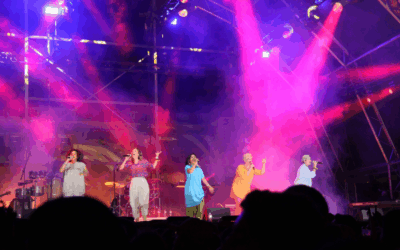
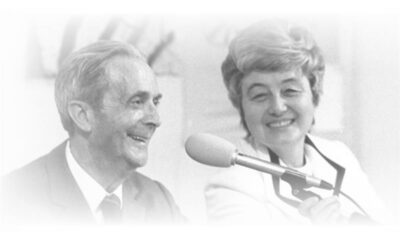
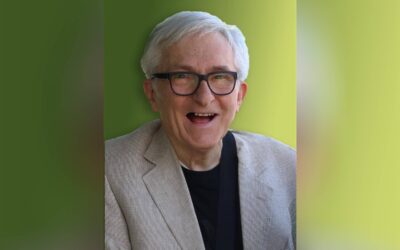
0 Comments